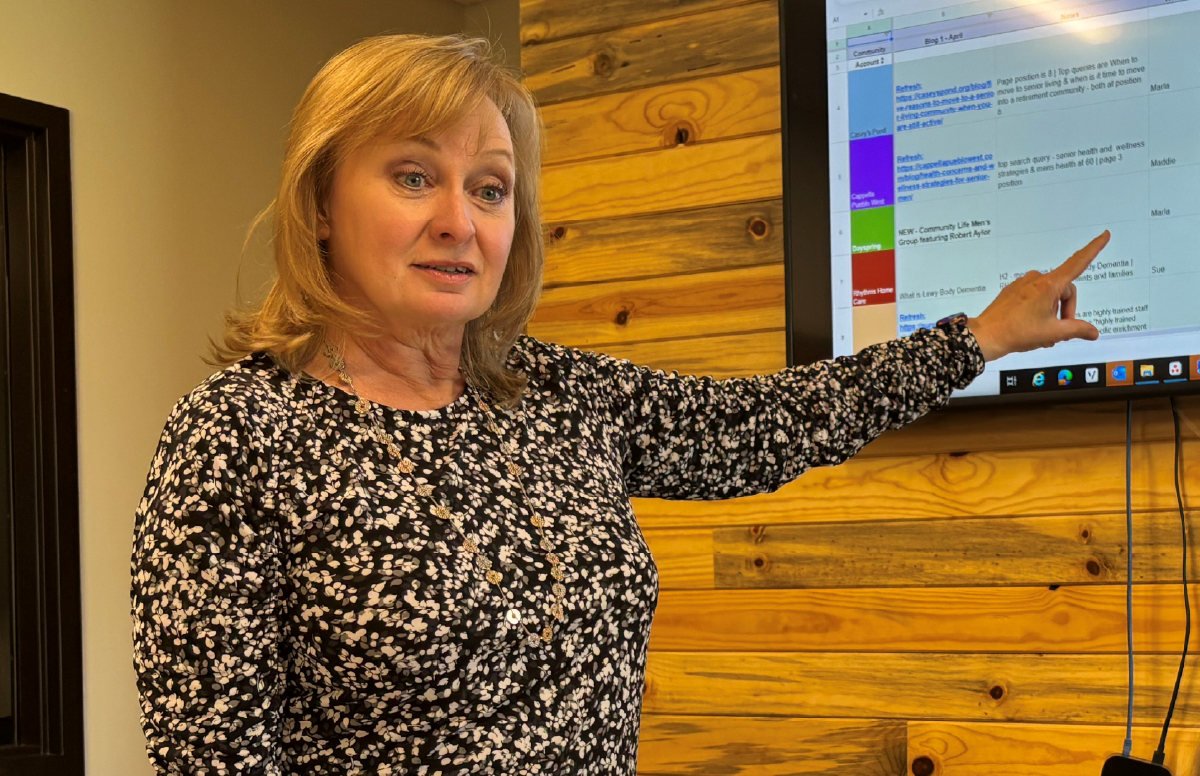Artificial intelligence’s (AI) power to increase efficiencies in aging services organizations extends to every area, from caregiving and wellness monitoring and beyond. Take marketing: whether streamlining mundane tasks or increasing sales prospects, as the experience of LeadingAge member Christian Living Communities (CLC) demonstrates, AI’s benefits are clear.
For the past six months, CLC, under the leadership of Robin Visser, director of marketing and digital strategies (pictured, at right), has been experimenting with AI tools to exploit new opportunities to reach prospective residents. Visser’s team, which serves sales teams for each of Englewood, CO-based CLC’s nine senior living communities plus home care services, is expanding its traditional marketing program based on search engine optimization (SEO) and paid Google search ads to include generative engine optimization (GEO). Using a test-and-iterate approach, Visser says, has increased CLC’s leads. What’s more, emerging AI tools are changing her team’s workflow for the better.
How GEO Expands Marketing Opportunities
A staple of online marketing, SEO relies on keywords and back-end meta descriptions to help search engines like Google deliver a list of resources in response to search queries. Now, however, with the advent of AI, when a Google user searches for information, Google also returns short paragraphs of summarized text, called an AI Overview, above its standard lists. These summaries, produced by GEO, provide more context, clarity, and narrative than SEO results. To the right of the summaries are three blocks, each with a photo, title, date, intro, authoring organization’s name, and link to a related article on the organization’s website.
To take advantage of these GEO summaries and their top billing on the search results page, CLC has adjusted its marketing approach. For example, in performing keyword research, Visser’s staff found evidence that “medication management” might perform well. Then they structured the first paragraph of a blog to answer a question that AI might be asked: “What is medication management, and how does it benefit my family?”
This approach has paid off. In just a few weeks, GEO results have exploded, Visser says, with CLC content now being ranked in most AI Overviews for the chosen keywords and visits to the CLC website rising. “We know that organic web traffic such as this converts to leads better, and leads are up,” said Visser. She expects the trend to continue, and if it does, CLC may consider reducing its paid Google ad campaigns, saving costs–with better results.
Building on Success
To maximize its success, CLC is focusing on testing results of the new GEO approach, then iterating and testing again. Every quarter, the CLC team picks two blogs per community to review and refresh, with AI searches in mind. Other experiments involve enticing large language models (LLMs) to scan the pages by using LLM.text, or LLM-generated text. CLC is also conducting writer workshops to teach their freelance writers how to structure the content for GEO.
The content that performs best meets Google’s criteria, demonstrating CLC’s experience, expertise, authoritativeness, and trustworthiness. In addition, CLC has found that clean, resource-driven copy without fluff performs the best for both SEO and GEO—which is the same user-friendly approach that residents seek.
Testing is essential. “We continue to test and review results,” said Visser. “Once we have an effective pattern, we will move in that direction, then keep testing other ideas and evaluating.” She cautioned that AI developments are changing search forever and introducing competition. “If you don’t address AI use in the search engines, your website is going to keep falling, and communities that use it are going to rise above you.”
How AI Tools Are Maximizing the Marketing Team’s Efforts
Additional AI tools are enabling the CLC marketing team to spend fewer hours on routine tasks and more time on marketing strategy. For example, Visser’s task to review Google ad data in Excel was very time consuming. Now, she taps Claude to instantly analyze the data, find areas of opportunity, and suggest keywords. Visser’s team has also used Claude to write meta descriptions for all website pages—normally an exhaustive task—in only one hour. With less time spent on data analysis, Visser puts more time into developing marketing strategy. “It makes me more actionable,” she says.
Developing Policies for AI Use
As it embraces AI, the CLC marketing team has set guardrails for AI use, to proactively determine what the organization wants, rather than have use cases shape the policy by default. Among CLC’s guidelines: All marketing copy must be at least 50 percent human-written, to add empathy, ensure the content is relevant to their communities, and weave in the brand voice. CLC does not use AI-generated images, to maintain authenticity. The team fact checks all AI-generated statistics to ensure accuracy. Visser also recommends using paid subscriptions to tools such as ChatGPT and Claude to enable an organization to work within its own sandbox; doing so decreases the chance that other large language models will analyze and learn from the organization’s search queries or content. And, of course, she cautions against feeding important data like financials into these AI tools.
Next Steps
For people who are considering using LLMs in sales and marketing, Visser advises beginning slowly. “Start trying it in different areas and see how it works. Be cautious. Like with any new technology, it takes a while for the bugs to get worked out—but try it. Dip your toe in the water.” Then enjoy the success of emerging new avenues for marketing and for internal team success.

 Shutdown Week Three: Impact of Ongoing Closure on Affordable Housing
Shutdown Week Three: Impact of Ongoing Closure on Affordable Housing


